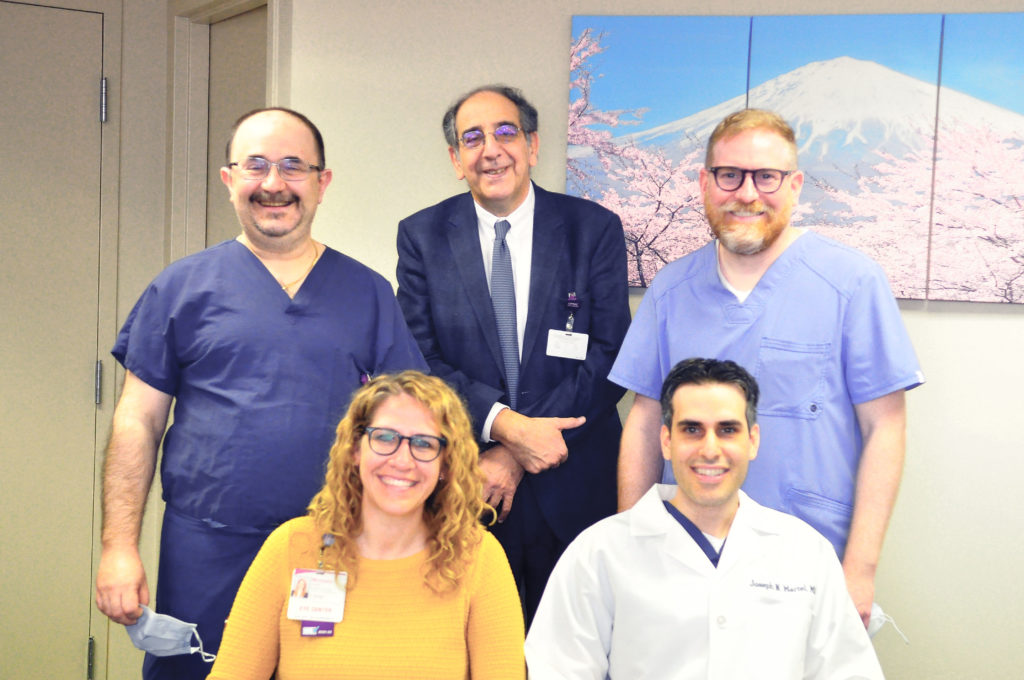Sight + Sound, Spring 2022
The UPMC Eye Center, led by Dr. José-Alain Sahel, recently became one of 14 ocular gene therapy treatment centers approved in the U.S. to offer LUXTURNA for retinal dystrophy.
Currently, there are no other FDA-approved therapies that target the underlying genetic cause of disease to halt progression or improve vision for individuals with inherited retinal dystrophies (IRDs). Until now, management of IRDs was primarily focused on addressing symptoms. For example, patients with IRDs are at risk for cystoid macular edema, which can affect their central vision. If a patient has this, they can receive drops to help remove the fluid and the resulting effect on their center vision. The Eye Center can also help patients maximize their function with their current vision level (i.e., low vision therapy and support provided by Drs. William Smith, MD and Holly Stant MS, OTR/L, SCLV, CLVT)
“There are many therapies in development for various types of IRDs, some of which are offered here at UPMC,” said Michelle Alabek, MS, CGC, genetic counselor and clinic coordinator. “Each time a patient is seen in clinic, our team provides them with the current landscape of therapies that may be relevant for them in the short-term and long-term based on their current status.”
And now there is an exciting new therapy. The main criteria for eligibility are that patients have retinal dystrophy due to the RPE65 gene and that they have viable retinal cells (determined by the physician based on various tests).
Approved by the FDA in 2017 for clinical use, LUXTURNA is administered as a one-time treatment underneath the retina. Patients with RPE65-related disease have difficulty with visual functioning in dark settings. The trials that led to approval by the FDA showed that patients had improved ability to function at lower levels of light a year after beginning treatment with this gene therapy. Eligible patients can choose to receive LUXTURNA therapy at any of the approved treatment centers, but UPMC is the only one in the Pittsburgh area.
The Retinal Dystrophy Clinic and Services (RDCS) at UPMC is comprised of a multidisciplinary team from the Department of Ophthalmology at the University of Pittsburgh, with expert retinologists (Drs. Sahel and Rosin on the adult side), ocular genetic counselors, low vision optometrists, and occupational therapists. Dr. Joseph Martel and Dr. Jay Chhablani perform the surgery for LUXTURNA.
“The goals of the Retinal Dystrophy Center are to provide early and precise diagnosis for patients and to offer innovative and trusted treatments to restore vision or stop progression of disease,” Alabek said. Many trials are in place or about to start (artificial retina, optogenetics, beuroprotection, corrective gene therapy,..)
Patients are seen on the sixth floor of the Oakland office. Once the UPMC Vision Institute is open, the clinic will move to that location. Low vision and genetic counseling services are also offered. Interested patients should contact 412-647-4732 or email retinal.dystrophy@upmc.edu.
“Because there are many different types, causes, and stages of retinal dystrophies, a one-size-fits-all treatment approach will not work,” Alabek said. “Multiple therapy options need to be available, so we are thrilled to now have LUXTURNA in our arsenal at UPMC. And this is just the tip of the iceberg. Many other therapies aiming to slow progression or to restore some vision are currently under development or in clinical trials at UPMC and around the world. These advances would not be possible without the dedication of scientists, researchers, financial supporters, and most importantly, patients and their families – this work has not been done for them, but rather with them, and it leaves us more hopeful than ever that we will be able to do more to help!”
